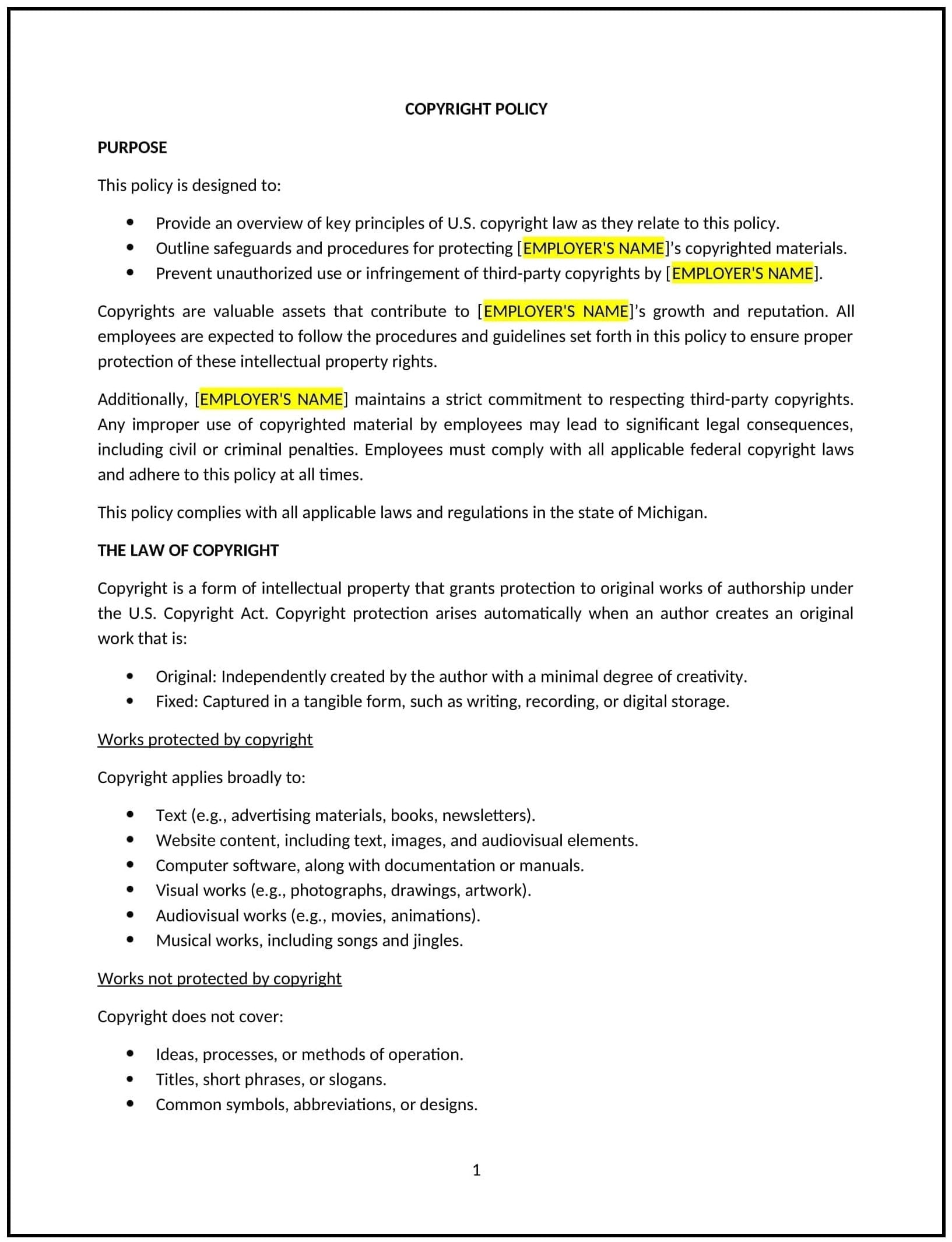Got contracts to review? While you're here for policies, let Cobrief make contract review effortless—start your free review now.

Customize this template for free
Copyright policy (Michigan)
A copyright policy provides Michigan businesses with guidelines for the protection, use, and management of copyrighted materials. This policy ensures that businesses respect copyright laws, avoid infringement, and use copyrighted works responsibly, both in terms of creating and utilizing content.
By adopting this policy, businesses can safeguard their intellectual property, promote compliance with copyright laws, and minimize legal risks associated with unauthorized use of copyrighted materials.
How to use this copyright policy (Michigan)
- Define what constitutes copyrighted material: Clearly identify what qualifies as copyrighted content within the business, including original works, published materials, digital content, software, and any other intellectual property.
- Outline copyright ownership: Specify the ownership of any work created by employees or contractors, ensuring that the business retains rights to materials created during employment or in the scope of the employee’s role.
- Establish usage guidelines: Set guidelines for how employees can use copyrighted materials, whether from external sources or internal works, and ensure they adhere to licensing agreements, fair use provisions, or other applicable rights.
- Address the use of third-party content: Provide clear rules for using third-party copyrighted works, including the need for permission, licensing, or proper attribution in order to avoid infringement.
- Specify reporting procedures: Outline the procedure for reporting suspected copyright violations, either by employees or external parties, and the steps to address these concerns.
- Educate employees: Offer regular training to employees regarding copyright laws, including what constitutes infringement, how to use copyrighted content lawfully, and the risks of violating copyright protections.
- Enforce compliance: Clearly define the consequences of violating the policy, including potential disciplinary action or legal consequences, and ensure consistent enforcement across the organization.
Benefits of using this copyright policy (Michigan)
This policy provides several key benefits for Michigan businesses:
- Protects intellectual property: Safeguards the business’s original works, ensuring that intellectual property is not misused or stolen by unauthorized parties.
- Minimizes legal risks: Helps businesses avoid copyright infringement lawsuits by ensuring that employees and the business comply with applicable copyright laws and licensing agreements.
- Promotes ethical use of content: Encourages employees to use third-party content responsibly and legally, fostering a culture of respect for intellectual property.
- Enhances reputation: By adhering to copyright laws, businesses maintain a professional reputation and demonstrate commitment to ethical and legal standards.
- Facilitates licensing and fair use: Provides a framework for understanding how copyrighted materials can be used legally, either through licensing, fair use, or obtaining proper permissions.
Tips for using this copyright policy (Michigan)
- Communicate the policy: Ensure that all employees are aware of the copyright policy, especially those who create content or handle third-party intellectual property, through onboarding and ongoing training.
- Provide regular training: Offer training sessions to educate employees on the basics of copyright law, fair use, and how to avoid common mistakes related to using copyrighted works.
- Monitor usage: Regularly audit the use of copyrighted materials within the business to ensure compliance with the policy and copyright laws.
- Be transparent about licensing agreements: Make sure employees understand the terms of any licenses the business holds for third-party content, and ensure they adhere to those terms in their use of the material.
- Review periodically: Update the policy as needed to reflect changes in Michigan copyright laws, industry practices, or business needs related to the use of intellectual property.